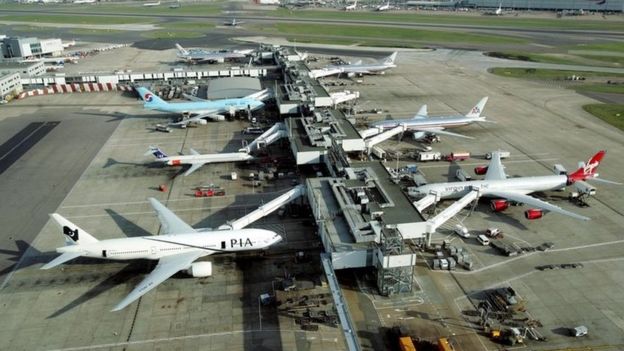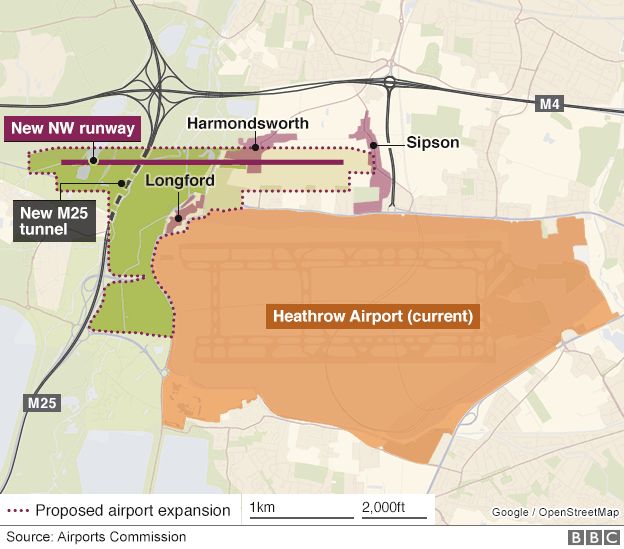Heathrow Airport: UK Cabinet approves new runway plan

Controversial plans for a third runway at Heathrow Airport have been approved by UK ministers.
The government’s economic sub-committee, chaired by Prime Minister Theresa May, backed the plans which were then approved by her full cabinet. Transport Secretary Chris Grayling said it was a “historic moment”.
Announcing £2.6bn in compensation for residents and noise abatement measures, he said it would only proceed if air quality obligations were met.
“The time for action is now,” he told MPs, insisting the decision was being taken in the national interest and would benefit the whole of the UK – with 15% of new landing slots “facilitating” regional connectivity.
The scheme, he insisted, would be funded entirely privately and while the expansion was a “number of years away”, he believed it could be concluded by 2026. MPs will be asked to vote on the expansion plans in the coming weeks.
The debate on expanding Heathrow has been going on for nearly 20 years.
The last Labour government backed the idea, and won a vote on it in 2009, but that plan was scrapped – and the idea of expansion put on hold for five years – by the Conservative-Lib Dem coalition formed after the 2010 election.
But the idea of expansion was resurrected and has been subsequently backed by the Conservatives. Ministers approved a draft national airports policy statement in October setting out the conditions for a new runway, Parliament has yet to give its approval for detailed planning to begin.
Opponents have threatened a legal challenge while Mr Johnson, who is MP for Uxbridge and South Ruislip in west London, has vowed to “lie down in front of bulldozers” to prevent it.
The BBC’s political editor Laura Kuenssberg said the Conservatives were divided and Mrs May was reliant on the support of Labour and the SNP to win the vote, which will take place within 21 days.
The BBC’s assistant political editor Norman Smith said ministers whose constituencies would be directly affected might be given a “get out of a jail card” – by being allowed to miss the vote or even vote against.
 ‘So expensive’: Why are critics opposed?
‘So expensive’: Why are critics opposed?
Campaigners argue that a new runway will breach the UK’s legal limits on air pollution and increase noise pollution with an extra 700 planes a day.
It will result in huge disruption to residents of nearby villages, such as Longford, Harmondsworth and Sipson, with hundreds of homes likely to be knocked down.
Robert Barnstone, from Stop Heathrow Expansion, told the BBC it was a “disappointing” day and the government was “failing people and failing the environment as well”.
Ms Greening said the runway would cost £18bn to build and a further £15bn would have to be spent to upgrade local roads and other infrastructure, which passengers would end up footing the bill for.
The Putney MP, who backs expanding Gatwick instead, suggested the idea of Heathrow as a national hub airport was outdated and the focus should be on improving regional capacity and connectivity.
“We are now moving to point-to-point travel,” she told BBC Radio 4’s Today. “Why should people who are living in Newcastle spend hours travelling down to London, then fly out somewhere else.
“There is nothing national about this national policy statement. It is just a runway in Heathrow.”
Ex-transport minister Theresa Villiers told BBC Breakfast it was going to be “another quite difficult day” for her colleague, Mr Grayling – who has faced criticism over the performance of the rail network since timetable changes came into force last month.
‘Right for UK PLC’
Heathrow’s owners say the airport is virtually full and a new runway, which is hoped would be operational between 2025 and 2030, would increase its capacity from 85.5 million to 130 million passengers.
The expansion is estimated to create about 60,000 new jobs and generate about £70bn in total economic benefits by the 2050s.
Mr Grayling said it would provide a “vital legacy” for the British economy and said he had accepted 24 out of the 25 recommendations made by the Transport Select Committee to improve the plans.
Residents whose houses are knocked down will get compensation worth 125% of their value – as well as legal fees and stamp duty paid for – while £700m would be available to fund noise insulation measures for those who decide to stay.
He said a ban on night flights was an “absolute requirement” and non-negotiable while he said landing charges paid by airlines must stay at current levels.
“This runway canmot be built if it does not meet air quality rules,” he added.
Sir Howard Davies, whose 2015 review recommended a new runway as long as environmental and community impacts were addressed, said “significant” concessions had been made on reducing early morning flights and minimising the impact on residents on the proposed flight path.
Modern planes were less noisy and polluting, he told BBC Radio 4’s Today programme, meaning airports were “gradually becoming friendlier neighbours”.
The carbon question
As one would expect, there have been contrasting reactions from business and environmental groups. London First, which speaks on behalf of firms in the capital, said the investment and employment case for a new runway was “proven”.
It urged MPs to back the government and support the “thousands of businesses who need these new connections”.
But Greenpeace said a new runway was not compatible with building a low-carbon economy.
“This airstrip alone will load the atmosphere with as much extra carbon as some entire countries pump out,” said the campaign group’s executive director John Sauven.
Source – bbc.co.uk
